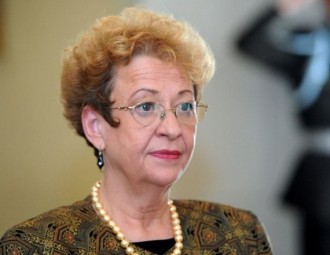Head of EU Delegation to Belarus: EU is not a mediator between authorities and opposition in Belarus

The EU is not a participant of the internal political process, said Andrea Wiktorin.
It is not a task for the European Union to act as an intermediary between the authorities of Belarus and those who are in opposition, Andrea Wiktorin, the new head of the EU Delegation to Belarus, said in an exclusive interview with BelaPAN.
“The EU is not a participant of the internal political process,” she said. “At the same time, the EU is engaged with all sides to advance EU-Belarus relations.”
Let us recall that in October 29 open letter to the heads of the EU institutions, Mikalai Statkevich, Uladzimir Niakliaeu, Anatoly Liabedzka, Paval Sieviarynec, and Siarhei Kaliakin urged Brussels to use its leverage on Aliaksandr Lukashenka to help civil society restart talks on democratic reform with Belarusian authorities.
Ms. Wiktorin confirmed that the EU had received a letter containing proposals for reengagement with Belarus. “Belarusian opposition leaders have sent a letter to the EU,” she said. “The letter contains something like a road map for development of relations with Belarus. The list of conditions includes changes in the electoral law, the necessity of which you have already mentioned. They also asked the EU to facilitate dialogue between the opposition and the authorities.”
Ms. Wiktorin promised that the EU would provide an answer to the letter.
The diplomat recalled that she met with a group of Belarusian opposition leaders on October 7 to exchange views on a number of issues. “As I said earlier, we are open to dialogue with all parties, all representatives of the Belarusian society interested in development of relations between Belarus and the European Union,” she said. “The European Union is based on values, and rule of law, freedom of speech, transparent and fair elections as a way for a people define the policy of its government are universal values of enduring importance.”
Andrea Wiktorin also mentioned a partnership agreement between Belarus and the EU.
Negotiations for the conclusion of such an agreement took place in 1995, but its ratification was frozen in 1997, Ms. Wiktorin said. “Yes, we need a framework for our cooperation,” she said. “And it would be an important step. Again, I will underline that we want to improve relations, and we are open to it. We move step by step. If relations develop in a positive direction and we are able to make progress, conclusion of such an agreement would be a logical step, effect of such improvement.”
Ms. Wiktorin stressed that the EU had no “fixed plan somewhere in the closet that one can take out and carry through.” “It is always a two-way street,” she said.
-
03.01
-
07.10
-
22.09
-
17.08
-
12.08
-
30.09








































